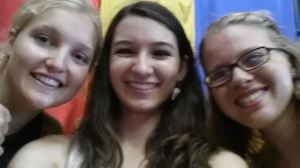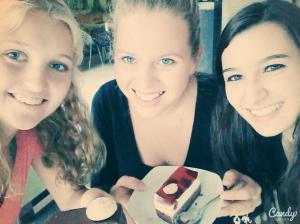This week at the office we have been very busy getting ready for our start of term. We have been learning techniques for successful game-based learning and preparing for our cultural workshops. But I don’t want to give away any spoilers, so in my blog post this week, I’m going to focus instead on adjusting to living in Romania. Life in Romania is a strange mixture of being in familiar European surroundings, with an unfamiliar Romanian flair. There are roads, supermarkets, restaurants, bars and everything else that you would expect to find in any other European town. At the same time, nothing is quite the same as it is in the UK.
It’s been fun experimenting with new foods; the Romanian Seven plant tea I tried was quite a success (although I’m still not sure exactly what the seven plants are….) but the sour pickled cabbage was not quite as enjoyable!! The shops themselves are also quite different. There are many shops, open 24 hours a day, which you cannot actually enter. They have large window displays showing all the products they sell, and a small window with the shop keeper. You tell this shop keeper what you would like, and they go and get it for you. As a former shop assistant I quite like the idea of keeping a shop with no customers coming in and messing up my displays, although I have not yet been able to pluck up the courage to buy anything from one of these shops. I will need a few more Romanian lessons first.
The money here is also very interesting. The notes are made of plastic, and have small see-through sections. They chose to focus on the arts when designing their money, with their bank-notes celebrating painting, music, theatre and flowers. This is a beautiful expression of the Romanian freedom of spirit and love of culture and nature. They have notes for every denomination of Lei – the equivalent of pounds or Euros, from one to at least one hundred (they go higher, but holing a one hundred note makes me feel giddy enough) and coins are reserved only for their smaller denomination of Bani – the equivalent of pennies or cents. I only used Bani when shopping for fresh vegetables in the market. If I manage to catch the word ‘Bani’ at the end of an incomprehensible string of sounds, I offer up a handful of small coins, and allow the bemused old farmer to select however many coins he would like. I really need to learn my Romanian numbers!
The people of Romania are very friendly and kind. Of course we received a wonderful warm welcome from AIST, but everywhere we go in town, people are also very happy to meet us, and help us out as we bumble through our days in Baia Mare, trying to get to grips with the Romanian way of doing things. While living in France I attended Zumba classes for a year, and never exchanged more than a smile and a ‘bonjour’ with the other women in the class. However, after my very first Zumba class in Romania, all the women were very open and friendly, quickly engaging me and Annika in conversation. On the other hand these charming and friendly people forget all their good manners and polite behaviour just as soon as they get behind the wheel of a car, and I join them on the road with my bike. I guess no nation can be perfect.
These are just a few of my observations so far. Overall, living in Romania is a very interesting cultural experience. For the most part, life here complies with the general European norms of cultural politeness. It is not as different as living perhaps in China or Japan where cultural expectations completely challenge all European norms, but there are just enough quirks and variations in everyday life to make living in Romania a thought-provoking experience.
Live long, and prosper.

